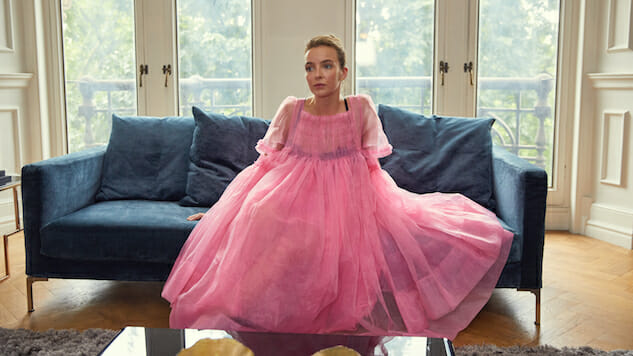The Perfect Petulance of Killing Eve‘s Jodie Comer
Photo: BBC America
Before the conclusion of Killing Eve’s killer first season, the killer in question finds herself in a pickle. Villanelle (Jodie Comer), the wunderkind assassin of Luke Jennings’ novels, and in turn Fleabag creator Phoebe Waller-Bridge’s demented, blackly comic thriller, has gotten herself locked up in a Russian prison to snuff out a potential snitch (and former lover), but before she can escape, she must spend a night in “solitary confinement” with a near-catatonic inmate named Inga. (“My understanding of solitary confinement is that it is solitary,” Villanelle quips to a guard as she enters the cell.) It’s here that Comer whirs into action: Hulllooo, Ingahhh, she says, twisting the line into the willful child’s grudging greeting. Sticking her hands in her pockets, she surveys the situation; she paces to and fro, whines that “it’s not even worth trying,” then suddenly smirks—she has an idea. She leans over Inga, bringing her face this close to her cellmate’s, and sniffs, with perfect, Russian-accented petulance, “You smell of cabbage.”
Comer has the round, watery eyes and button nose of a cartoon candy-striper, or teacher’s pet: Were Killing Eve not crammed full of Villanelle’s rococo murders (using poison-tipped hairpins, toxic perfumes, prison shivs), you’d scarcely be surprised if she tried to sell you cookies. This, of course, is much of the fun, and Waller-Bridge signals her interest in the juxtaposition from the start of the pilot. The series begins in a Vienna ice cream shop, as Villanelle stares down a small child—and then, imitating the shop clerk, forces a smile. Her one moment of genuine glee comes as she departs, and knocks the girl’s ice cream into her lap. In Comer’s hands, Villanelle is the maestra of childish chaos, of puckish tricks, cunning pranks, peals of mischievous laughter. “If you can’t play alone, you’ll have to play with your little brothers and sisters,” her handler and father figure, Konstantin (Kim Bodnia), clucks near midseason, during a pastel-palette Parisian “birthday party” to which she goes in costume as him: She might be Jo March, or Scout Finch, if Laurie and Dill had called them “small-breasted psychos.”
This playfulness—Waller-Bridge’s straight-up refusal to succumb to the dread seriousness of the “prestige” drama—is Killing Eve’s first hook: Alongside Sandra Oh’s exquisite deadpan, as Villanelle’s pursuer/prey, Eve Polastri, Comer’s elastic expression becomes the active ingredient in a cat-and-mouse Abbott and Costello routine so entertaining that the series’ questionable plotting begins to seem a moot point. But it’s also, I see now, central to Killing Eve’s thematic substructure, which, as Oh herself suggested to Paste, turns not on the mechanics of female friendship, but on the roles women are expected, or allowed, to fill: “Eve’s dissatisfaction,” as The Ringer’s Alison Herman writes, “feels connected to the same self-destructive urge that led Fleabag’s antiheroine to blow up her life… [S]he wants something more, whether or not that something is manifestly immoral and possibly going to kill her.” To press Herman’s argument further, Killing Eve isn’t about friendship, exactly; nor is it quite about obsession (though Eve and Villanelle become obsessed with each other), or kinship (though the series is run through with familial connections both fictive and real), or even sex (though there is something seductively illicit about the main characters’ mutual fascination). It is, fundamentally, about Villanelle, or at least Eve’s impression of her: She is the enfant terrible, the spendthrift, the rule-breaker, that practical Eve could never, would never, be. Until she is.